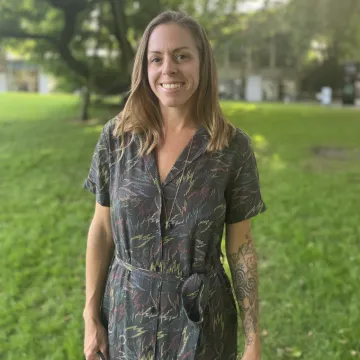Megan Carney
MeganCarney

Megan Carney is a sociocultural and critical medical feminist anthropologist with specializations in critical migration and diaspora studies; food and climate apartheid; migrant health; women’s and youth migration; social reproduction, social solidarity, and the politics of (collective) care; critical food studies; and intersectional and diasporic feminist methodology and pedagogy. Her fieldwork is focused in the western United States and in Italy, specifically Sicily.
Dr. Carney's first book The Unending Hunger: Tracing Women and Food Insecurity Across Borders (University of California, 2015) examines how constraints on eating and feeding translate to the uneven distribution of life chances across borders, how neoliberal economic policies render hunger and displacement, and how the framework of “food security” continues to dominate national policy in the United States. Inspired by Chicanx and transnational feminist theory as well as critical perspectives on economic restructuring, Carney approached these issues through the lens of gender – in addition to race, class, and citizenship – arguing that “food security” as a biopolitical project rests primarily on the shoulders of low-income women whose caring labors in the realm of social reproduction are generally devalued by society. The book received the 2015 CHOICE award for Outstanding Academic Title, was named in 2018 by Healthline as one of the Best Books on Food Insecurity, and was selected in 2019 for the California Books to Action program.
Dr. Carney's second book (University of California Press, 2021), Island of Hope: Migration and Solidarity in the Mediterranean is an ethnography of the politics of economic austerity and migrant reception in southern Europe -- specifically Sicily -- and the emergent forms of "solidarity work" being performed by citizens and noncitizens on the frontlines of migrant-receiving communities. She continues to collaborate closely with a number of grassroots migrant solidarity initiatives, including a participatory film and storytelling lab with migrant youth for which she and her collaborators received an Engaged Research Grant from the Wenner-Gren Foundation.
Presently, she is engaged in ongoing, collaborative research with several community organizations in Tucson focused on racial justice and health equity through an abolitionist lens. Foregrounding theory from Black Geographies and Black feminist medical anthropology, the collaboration centers the experience of African diasporic populations in the American Southwest.
In addition, she is a co-founder and co-director of “The Future of Food and Social Justice: A Youth Storytelling Project.” Seeking to uphold UArizona’s obligations as a land grant and Hispanic-serving institution, the project centers the experiences of BIPOC, queer, and trans students at the UA by providing paid internships and diverse opportunities for mentorship, storytelling, and community engagement.
From 2021-22, Dr. Carney was a Fulbright Scholar with the Fulbright Schuman European Union Affairs Program. She is a former Udall Public Policy Fellow (2019-20) and Public Voices Fellow with The Op-Ed Project (2018-19).
Dr. Carney serves as Director of the UA Center for Regional Food Studies and on the steering committee of the UA Basic Needs Coalition. She is affiliated faculty in Africana Studies, Arid Lands Resource Sciences, the Center for Middle Eastern Studies, Food Studies, Human Rights Practice, Latin American Studies, and Middle Eastern and North African Studies. She is a co-founding member of the feminist collective Nutrire CoLab (and the eponymous podcast) and participates as a member of the interdisciplinary Microbes and Social Equity working group.

